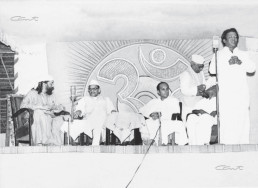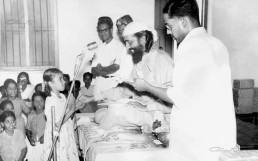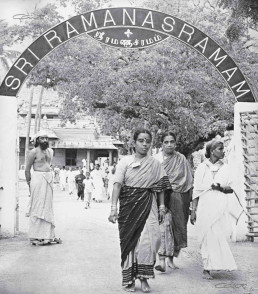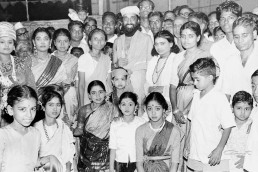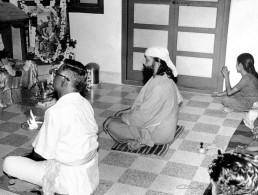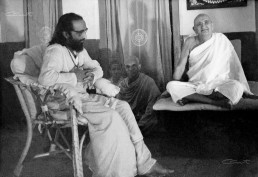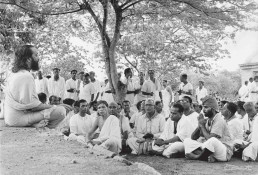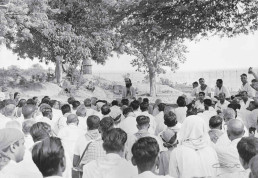
Jnana Yajna 60

Year & Dates:
August 02, 1959 to September 30, 1959

Yajna Topic:
Mandukya Upanishad & Karika

Place:
Chennai (Madras), India.
“The task that Swamiji has set before him is precisely to undertake this mission, to blow away the dust that has settled over our great scriptural works, take out and polish the old ideas contained in them, by giving a coat of fresh paint, as it were, and present such ideas to the people of our country in a manner which is easily assimilable. It is a noble, elevating, and commendable task, and Swami Chinmayananda is doing a great service to the country.” So spoke the president of the Madras yajna committee, Sri. M. Ct. Pethachi, as he welcomed Pujya Gurudev for the 60th Jnana Yajna on August 1, 1959. Sri Gulzarilal Nanda, a minister and economist, remarked that moral stature is required to avert an economic debacle in the land.
And, Pujya Gurudev affirmed: “Lakshmi (material wealth) without Narayana (spiritualism) is useless, dangerous. Self-mastery must be gained first, and prosperity and happiness will follow.”
Beyond, with Innocent Ease
To master the Self, there is no better scripture than the brilliant, mind-dissolving Mandukya Upanishad which was the focus of the 56-day, 60th Jnana Yajna. Then, the added richness of contemplation through the sessions of Bhagavad Gita chapters 2 & 3, made the avid seekers of Chennai slip into an ethereal realm, indescribably bountiful in experience.
To witness thousands of people, especially the youth, become immersed in the mystic text of Mandukya Upanishad and the guiding philosophical explanations of Gaudapada’s Karika was extraordinary. But it was no surprise – Pujya Gurudev as a teacher so unique, with His lucid, relatable anecdotes, and amazing analogies, made the audience revel and attempt to reach that state beyond. As Pujya Gurudev unfolded the significance of Om and the import of its syllables, meditation upon Om as the transcendent and immanent Self took on a deeply penetrative and equally pervasive perspective.
The Akanda Kirtan from September 12th infused the meditative atmosphere with the vibrance of devotion. Then, on September 17th, the Ganga-jal sprinkling ceremony drenched the hearts of the enthralled audience who came in record numbers for that magical experience at the hands of Pujya Gurudev. To give a taste of the deep introspection that Mandukya Upanishad extolled, Pujya Gurudev arranged for a sannyas-themed excursion to the Sathanur jungle. The engineering of Sathanur dam caused wonder, and the satsang with Gurudev where He posed questions on the concepts sung in the second, third, and twelfth chapters of the Gita was further amazing. The acme of experience was when the seekers were asked to spread out in the jungle and contemplate in solitude on the Gita or the upanishad.The two hours of acute sadhana in the sylvan serene woods left the 400 seekers in a state of wordless bliss. Pujya Gurudev then led the group to another blissful meditation in Ramanasrama of Thiruvannamalai before they returned to Chennai, concluding a Upanishad cum Gita Jnana Yajna that equipped the aspirants with a new vision of Brahman all around and beyond.
A delightful event that occurred after the 60th Jnana Yajna was the All India Bala Mahotsav from September 27-29, 1959. Observing Pujya Gurudev inspire and enthuse children from the many flourishing Chinmaya Bala Vihars, it was evident that He moved effortlessly among the wisest sages and the most innocent children.
Photo Gallery
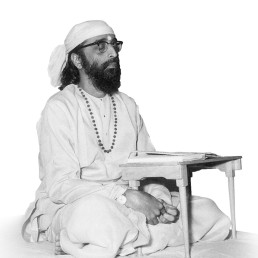
“Think,” Says Pujya Gurudev
The mind, gathering the impressions of its past actions, records as if it were its own songs, good, bad or indifferent! Like a gramophone record, it is being preserved or conveyed from one point in time and place to another different point in relativity. These mental records can send back songs of joy or sorrow, peace or struggle , only when they are in direct contact with a “needle”; the “needle” in the human structure is the ego center!
So long as an individual identifies himself with his mind and body, the ego-center in him must necessarily produce the impressions for his mind. One who has realized the Self through the true mental sublimation or ego destruction shall no more produce any more reactions caused by his past actions. Thus, at the moment of the total sublimations of the mind, all these impressions of the entire past get annihilated and, therefore, the ego becomes free from birth.
From Mandukya Upanishad & Karika Yajna Prasad
Mandukya Upanishad Simplified!
Experience a paradigm shift in understanding as we explore the timeless wisdom of Mandukya Upanishad. Through insightful analysis and introspection, we unravel the illusions of creation and unveil the essence of consciousness lurking beneath the surface of reality.
